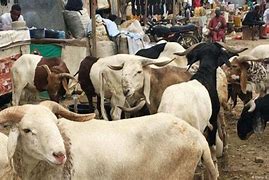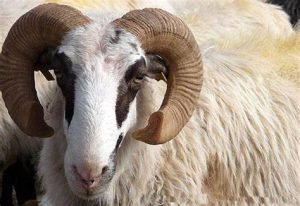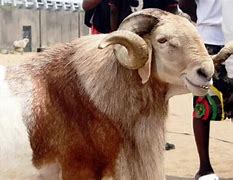*Hoodlums jump fence, steal ram in Abuja
As the Eid-el-Kabir celebration by Muslim faithful inches closer, there is palpable tension among Muslim faithful in Nigeria as the prices of rams soar above reach.
It was gathered that the prices of animals, especially rams, used for sacrifice during the annual festival have skyrocketed in the major markets.
Ram prices in major markets across Lagos, Ogun, Oyo, Kaduna, Abuja, Kano have shown huge upward review of price.
Recall that the Eid-el-Kabir is celebrated annually by Muslims worldwide through the slaughtering of animals to reflect the Prophet Ibrahim’s willingness to sacrifice his son Ismail for the sake of God.

The hike in the cost of basic commodities in Nigeria has been boldly reflected in the livestock sector. The situation is likely to deny the average Muslim the means to partake in the annual sacrifice amidst economic hardship.
The high cost of Sallah rams must have triggered some hoodlums to scale a fence and stole a ram kept by one Malam Mundi Shuaibu for the Eid el-Kabir at Unguwar Sabon-Tasha in Abaji Area Council of the FCT.
The victim’s house shared a fence with the cattle market in the area which holds every five days.
A neighbour, Abdullahi Ahmed, said the incident happened on Saturday around 1:12pm after the victim had gone out.
He said, “When my neighbour returned around 4pm and went to his backyard where he tied the ram, he found the ram had been stolen.
Ahmed told our reporter that the owner of the ram said he bought it at N215,000 last week for the forthcoming Eid el-Kabir.
A visit to Kara market, Ogun State, Abbatoir in Agege Lagos, Kuto Market, Abeokuta and Alagbado Ram market, Ijaiye, Lagos showed that there were rams, but they were expensive.
A ram seller, Lookman Usman, said a ram sold for N100,000 last year now goes for between N200,000 and N250,000.
According to him, the price of a medium-sized ram, which cost N120,000 in 2023, is now going from N400,000 to N600, 000. The large ram that cost N700,000, or N900,000 has increased to N1 million, while the smallest is sold for between N70,000 and N80,000.
Another seller, Hassan Mohammed, lamented low patronage, saying buyers were not forthcoming.
He said, “I have been in this business for over 15 years. When you compare the prices in previous years, you will discover that they are not the same. This year, the cost of rams is very high. The places where we used to buy them sold to us at very high prices. The inflation rate is affecting the prices of everything, including livestock.
“Their feeds are also expensive; we buy a sack of feed for N20,000 to N25,000; it used to be N10,000. The other cheap feed we buy is for N7,000.
Mohammed Idris who bought a ram at N150,000 said: “This year’s price is very high compared to last year. The prices of rams keep increasing every year. I just bought it because I had no option.”
Some of the residents who spoke to our correspondent said the high prices of rams will prevent poor Nigerians from buying for this year’s Sallah.
Mr. Musa Yahaya, a labourer and a father of seven, said, “Everything has gone up in the country, including sachet water. The country is becoming very tough on a daily basis. We can hardly feed ourselves. Rice is expensive; in fact, everything is high. Tomatoes that were sold for N1,500 before are now N6,000. I don’t know where we are going in this country.”
They all called on the government to make life easy for the average Nigerian, lamenting that the hike in food prices is unbearable.
The mood in Bauchi is tinged with anxiety for many residents because the soaring prices of rams and cattle overshadow the joy of celebrating the festival.
Aminu Bala, a father of five, said, “Last year, I bought a ram for N35,000, but the prices have doubled this year. It’s disheartening.”
However, Bala’s experience is not unique. Many families in Bauchi are struggling to afford ram or cattle, an essential part of the Eid-el-Kabir celebrations, where Muslims commemorate the willingness of Prophet Ibrahim to sacrifice his son, Isma’il, in obedience to Almighty Allah.
Traditionally, families slaughter a ram as a symbol of sacrifice and share the meat with relatives and the needy. However, with the country’s current economic situation, fulfilling this religious duty is becoming increasingly challenging. The impact of inflation and the rising cost of living is felt across all sectors, and the livestock market is no exception.

A livestock driver, Olaniyi Ogunmona Musa, attributed the low turnout to inflation and a shortage of rain, which have driven animal prices to unprecedented heights. “Last year, the cheapest rams were sold for about N40,000 to N45,000, but now the lowest price of ram is about N100,000,” he decried.
Also, a cattle dealer, Dahiru Garba, said he had never seen such a low turnout. “Last year, by this time, I was receiving calls from customers in Kano, Kaduna, and Katsina, but this year, I am struggling to sell due to high transportation costs,” he said.
He explained that cows that sold for about N150,000 last year now cost over N400,000, while those that sold for N400,000 now exceed N1 million.
Marketers are worried about the financial strain they face. “If the government does not intervene, we will suffer significant losses,” Garba warned.
Speaking, Zakariya Mato, the Association of Buyers of Animals and Animal Feeds, Bauchi chapter’s treasurer, noted that the low turnout is partly due to the tradition of buyers arriving just two to three days before Sallah.
“Some delay their purchase for security reasons. Previously, people come here to buy rams and cattle on Sallah day and even after,” he said.
Business Insider


